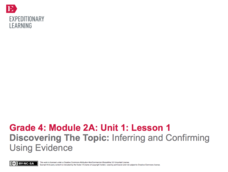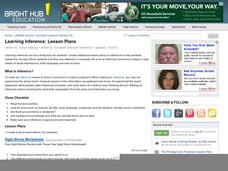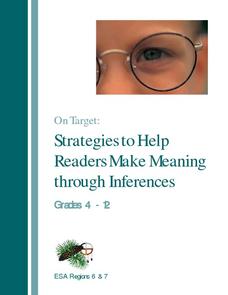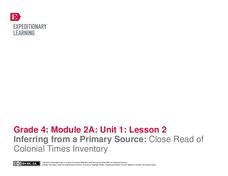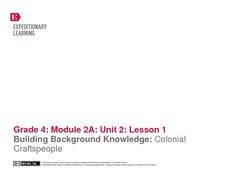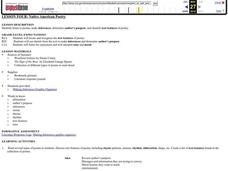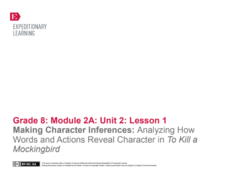Curated OER
Teach Inferences in a Systematic and Engaging Way
Benefit from specially designed materials to help you teach inference in a systematic and rewarding way!
EngageNY
Mid-Unit 2 Assessment: Inferring About the Silversmith Trade in Colonial Times
The seventh lesson plan in this unit on colonial trade assesses fourth graders' ability to use details from an informational text to make inferences and create a piece of informative writing. The included assessment begins with learners...
Curated OER
Mini-Lesson Planning for Inferences
Making inferences and drawing conclusions is a key component to successful active reading. Encourage your class to use context clues and prior knowledge to infer different elements of a story, including the setting, plot, and character...
EngageNY
Discovering the Topic: Inferring and Confirming Using Evidence
Allow your class to figure out what they will be studying through an inquiry-based anticipatory set that involves analysis of mystery documents and practice with making inferences. The lesson plan document includes a detailed description...
EngageNY
End of Unit 1 Assessment: Inferring and Synthesizing (From Two Texts) About Life in Colonial America
Close your colonial America unit with a performance-based assessment. Class members will show their proficiency in several skills including using details to back up inferences, determining the meaning of words in context,...
EngageNY
Taking Notes Using a Graphic Organizer: Inferring About Work and Play in Colonial America
What was life like in colonial America? Follow this lesson and your pupils will find out what people in colonial times did for work and for fun. Ask learners to compare and contrast the two texts and explain what the reading helped them...
K12 Reader
Inference Practice: Who Am I?
Have a little fun teaching your class about inferences with this short and simple guess who exercise. Provided with five short passages describing different types of people, young learners must read each one...
Curated OER
Using Poetry in Teaching Reading to Special Education Students
A series of well-written activities, these lessons prompt middle schoolers reading below grade level (at a second, third, or fourth grade level) to use poetry to practice basic reading skills. They rhyme, build words, make inferences,...
Curated OER
Learning Inference
Making inferences can be a tricky proposition for middle schoolers. In the lesson presented here, pupils practice the skill of drawing a conclusion and making a judgment - which are what making an inference is all about! There are five...
EngageNY
Inferring about Character: Getting to Know Percy (Chapters 1 and 2)
What a character! Scholars look at two chapters in The Lightning Thief to make inferences about the character Percy. They record both the character's challenges and responses. Learners then work in their triads to discuss the gist...
EngageNY
Building Background Knowledge and Making Inferences: What Is a Natural Disaster?
That's a disaster! Scholars complete a gallery walk to view images and make inferences about natural disasters. They fill out a note catcher about what they observe and infer any questions they may have. They then participate in a World...
Curated OER
On Target: Strategies to Help Readers Make Meaning through Inferences
Here's a resource that explicitly teaches, models, and provides readers with opportunities to practice the process of drawing inferences from text. Packed with strategies elementary, middle, and high school teachers can use, the resource...
EngageNY
Inferring from a Primary Source: Close Read of Colonial Times Inventory
Teach your class about colonial America through an examination of primary documents. First though, start vocabulary notebooks for content-specific and academic vocabulary. Pupils can keep this record during the entire module. Once this...
Curated OER
Mini-Lesson: Planning for Inferences
The five lessons in this resource are designed to teach class members how to read between the lines, how to use personal experience/background knowledge/schema, along with the information in the text, to make assumptions about...
EngageNY
Building Background Knowledge: Colonial Craftspeople
In the first lesson plan of this unit on colonial trade, fourth graders gain background knowledge of different jobs performed by early colonists. The class begins with a slide show presentation that includes a variety of great...
Academy of American Poets
Teach This Poem: "In the Next Galaxy" by Ruth Stone
Imagine what life might be like in a different galaxy. That's the challenge young scientists take on in a warm-up activity designed to prepare them for a close reading of Ruth Stone's poem "In the Next Galaxy." After class members share...
EngageNY
Making Inferences About Informational Text: Science Talk on How My Insect Contributes to the Rainforest Ecosystem
We need to talk. Learners participate in a science talk by discussing the idea of how insects are important to the rainforest. They record notes about their conversations as they talk. For homework, pupils add to their field journals.
Curated OER
Teaching Inference with Trash and Mystery Objects
Students practice solving mysteries and using inference skills by digging through trash. In this problem solving lesson, students investigate groups of garbage to determine what type of person the garbage belonged to....
Curated OER
Native American Poetry
Identify text features, make inferences, and discover the cultural significance of Native American Poetry. Sixth graders read several Native American poems and use graphic organizers and literature response logs to record their feelings...
Curated OER
Analyzing Atmosphere: Macbeth Murder Scene and Dagger Speech
Shakespeare's Macbeth (Act II, Scenes I and II) lacks explicit details of the murder of King Duncan, yet the author creates an atmosphere that allows us to visualize the event. Readers interpret the "Dagger Speech" by writing stage...
EngageNY
Making Character Inferences: Analyzing How Words and Actions Reveal Character in To Kill a Mockingbird
Partner up! After an I have/who has activity, readers partner with one of their discussion appointments to add evidence from chapters 11-13 in To Kill a Mockingbird to the Atticus Note-catcher. Partners then share with the class and add...
Curated OER
Making Inferences While Identifying Similes and Metaphors
Use this lesson to study similes and metaphors and the inferred meaning. In this language arts lesson, 5th graders write their own similes and metaphors. A worksheet is provided for extension work or to check understanding as homework.
West Corporation
Making Inferences – Use Your Mind to Read!
How can you tell if someone is happy? The lesson works with elementary and middle school scholars to activate their schema and pay attention to details to make inferences in their daily lives, poetry, and other literature. Cleverly...
EngageNY
Learning About Farms in Colonial America: Explicit vs. Inferred Information
Aid your pupils in understanding the terms explicit and inferred while teaching them about colonial farmers. The third activity in the module builds off the previous activity and focuses heavily on inference. Learners analyze a...
Other popular searches
- Teaching Inference Skills
- Teaching Inference Reading
- Teaching Inference Implicit
- Teaching Inference 2nd
- Teaching Inference +Reading



